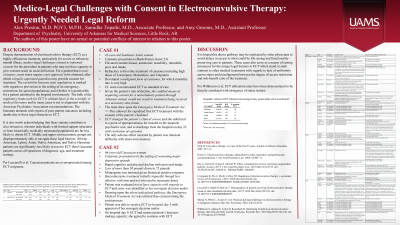Systems-Based Practice and Administrative Psychiatry
Session: Poster Session
(181) Medico-Legal Challenges with Consent in Electroconvulsive Therapy: Urgently Needed Legal Reform

Trainee Involvement: Yes

Alex Preston, MD,MPH
Psychiatry Resident Physician
University of Arkansas for Medical Sciences
Little Rock, Arkansas, United States
Samidha Tripathi, MD
Associate Professor
University of Arkansas for Medical Sciences
Little Rock, Arkansas, United States
Amy Grooms, MD
Assistant Professor
University of Arkansas for Medical Sciences
Little Rock, Arkansas, United States
Presenting Author(s)
Co-Author(s)
Cooper JJ, Brakel SJ, Dinwiddie SH. Limiting Legal Intrusions in ECT Practice, a Commentary on "Regulation of Electroconvulsive Therapy: A Systematic Review of US State Laws". J ECT. 2018 Mar;34(1):69. doi: 10.1097/YCT.0000000000000476. PubMed PMID: 29329153 Iltis A, Fortier R, Ontjes N, McCall W. Ethics Considerations in Laws Restricting Incapacitated Patients’ Access to ECT. J Am Acad Psychiatry Law. 2023 Mar;51(1):47-55. doi: 10.29158/JAAPL.220029-21. PubMed PMID: 36646453 Livingston R, Wu C, Mu K, Coffey MJ. Regulation of Electroconvulsive Therapy: A Systematic Review of US State Laws. J ECT. 2018 Mar;34(1):60-68. doi: 10.1097/YCT.0000000000000460. PubMed PMID: 28991068 Parker C, McCall W, Rosenquist P, Cortese N, Spearman-McCarthy V. Achieving Equity in Informed Consent: A Culturally-Informed Perspective for the Consideration and Consent of Minority Patients for Electroconvulsive Therapy. Am J Geriatric Psychiatry. 2020 Nov;28(11):1129-1132. doi: 10.1016/j.jagp.2020.03.009. PubMed PMID: 32321667
Background: Electroconvulsive therapy (ECT) is a well-established highly efficacious and safe treatment indicated for severe or refractory mental illnesses. Despite this, ECT remains greatly underutilized due to associated stigma along with medico-legal challenges related to informed consent for the procedure in patients who may be unable to consent (Iltis 2023). Most states require a court order for non-voluntary ECT, though there is marked variation in regulation of ECT. Restrictions often result in delays in access to life-saving and functionality-preserving treatment and further perpetuate the stigma surrounding ECT (Livingston 2018).
Case: We highlight two cases of neuropsychiatric illness in which navigating the legal process for court-ordered ECT as outlined in the mental health code would have significantly increased the risk of mortality and morbidity. The consultation and liaison team instead navigated our state’s Emergency Medical Treatment Act Code to secure timely access to ECT for an incapacitated patient. Informed consent was obtained from the surrogate in compliance with the state’s Consent to Treatment Code and hospital’s informed consent policy. This approach resulted in favorable patient outcomes. These cases help establish a precedent in the state of Arkansas for utilizing ECT as an emergent medical treatment in life-threatening conditions, without the need for a court order.
Discussion: The existing legal architecture in most states imposes restrictions on non-voluntary ECT and outlines a process that does not account for the emergent and life-threatening nature of neuropsychiatric conditions. Surrogates and guardians can consent to far more toxic medical treatments for incapacitated loved-ones under the “emergent medical treatment act” (Cooper 2018). The legal barriers restricting use of ECT are not commensurate with the risk-benefit evaluation applied to other medical treatments and discriminate against patients based on their disability. Patients belonging to racial and ethnic minorities are often disproportionately affected by these imposed barriers (Parker 2020).
Conclusions: Using these cases as examples, we will present a guideline for navigating complex medico-legal challenges in consent for ECT. We also hope these cases will raise awareness for the growing need to rebrand and reclassify ECT as a treatment for “neuropsychiatric conditions” because the term “mental” in its indication for management of mental disorders, has an implicit bias.
References:

